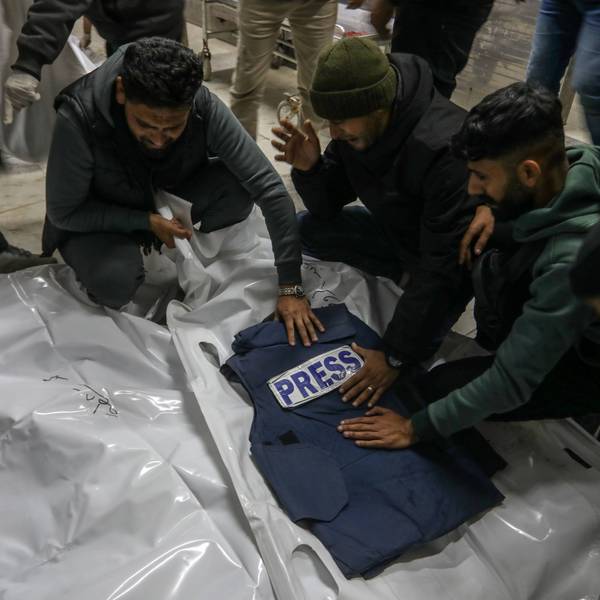An
analysis published Tuesday shows that three of the most influential newspapers in the United States—The New York Times, The Washington Post, and The Los Angeles Times—have reliably shown a bias against Palestinians in their coverage of Israel's assault on Gaza and its reverberating consequences.
Writer Adam Johnson and researcher Othman Ali examined the three outlets' coverage of Israel-Gaza between October 7—the day of the deadly Hamas-led attack on southern Israel—and November 24, which marked the start of a negotiated pause that
ended just a week later. The Israeli bombardment has continued relentlessly since.
The pair's analysis, published in
The Intercept, found that across more than 1,000 articles, the three newspapers showed a "consistent bias" against Palestinians. Specifically, the outlets "disproportionately emphasized Israeli deaths in the conflict; used emotive language to describe the killings of Israelis, but not Palestinians; and offered lopsided coverage of antisemitic acts in the U.S., while largely ignoring anti-Muslim racism in the wake of October 7."
As the Gaza death toll surged during the first month and a half of Israel's assault, the three newspapers' mentions of Palestinians in their coverage declined, Johnson and Ali found.
In the period between October 7 and November 24, the outlets used the words "slaughter" and "massacre" a combined 180 times when describing the toll of the Hamas-led attack on Israel. The newspapers used those terms just five times when describing Gazans killed by the Israeli military.
"The Washington Post employed 'massacre' several times in its reporting to describe October 7," Johnson and Ali wrote. "'President Biden faces growing pressure from lawmakers in both parties to punish Iran after Hamas' massacre,' one report from the Post says. A November 13 story from the paper about how Israel's siege and bombing had killed 1 in 200 Palestinians does not use the word 'massacre' or 'slaughter' once. The Palestinian dead have simply been 'killed' or 'died'—often in the passive voice."
Johnson and Ali previously
found similar bias against Palestinians in the coverage of CNN, Fox News, and MSNBC.
The analysis also shows that the newspapers' coverage of the Israeli assault's impact on children and journalists has been relatively sparse given the unparalleled impact the war has had on kids and members of the media.
In the three weeks after October 7, Israeli forces
killed more children in Gaza than were killed in all of the world's armed conflict zones since 2019, according to Save the Children. The Committee to Protect Journalists said last month that more reporters were killed during the first 10 weeks of the war "than have ever been killed in a single country over an entire year."
Johnson and Ali wrote Tuesday that "the lack of coverage for the unprecedented killing of children and journalists, groups that typically elicit sympathy from Western media, is conspicuous."
"By way of comparison, more Palestinian children died in the first week of the Gaza bombing than during the first year of Russia’s invasion of Ukraine, yet
The New York Times, Washington Post, and Los Angeles Times ran multiple personal, sympathetic stories highlighting the plight of children during the first six weeks of the Ukraine war."
The analysis comes days after
The Intercept highlighted a longstanding CNN policy under which the outlet runs its Israel-Palestine coverage through its Jerusalem bureau, which must abide by the rules of the Israeli military's censor.
The few journalists who have been
allowed to enter Gaza as embeds with Israeli forces are required to submit their materials and footage to the Israeli government for review.
The Western media's slanted coverage of Israel's devastating war on Gaza has drawn outrage from individual journalists, including some who work at
The Washington Post and Los Angeles Times.
"We are renewing the call for journalists to tell the full truth without fear or favor," reads an
open letter signed by hundreds of journalists in November. "To use precise terms that are well-defined by international human rights organizations, including 'apartheid,' 'ethnic cleansing,' and 'genocide.' To recognize that contorting our words to hide evidence of war crimes or Israel's oppression of Palestinians is journalistic malpractice and an abdication of moral clarity."
After the letter was released, dozens of signatories—including journalists from
The Associated Press and Washington Post—asked that their signatures be removed, fearing retaliation from their employers.




